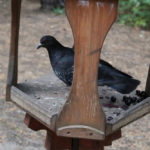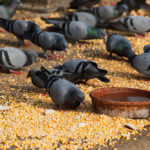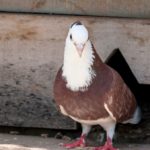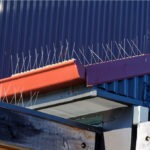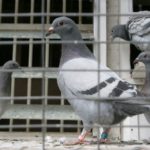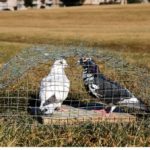We’ve all heard the old urban legend: if you feed pigeons uncooked rice they’ll explode. But while this is (thankfully) untrue, there are still certain foods that pigeons should and shouldn’t eat.
Whether you’re feeding wild pigeons in your garden or looking after a new pet, it’s important that you give a pigeon the proper diet to ensure it stays happy and healthy.
However, it can be hard to know what to feed a pigeon – like all animals, they have nutritional requirements that some foods are better than others at filling.
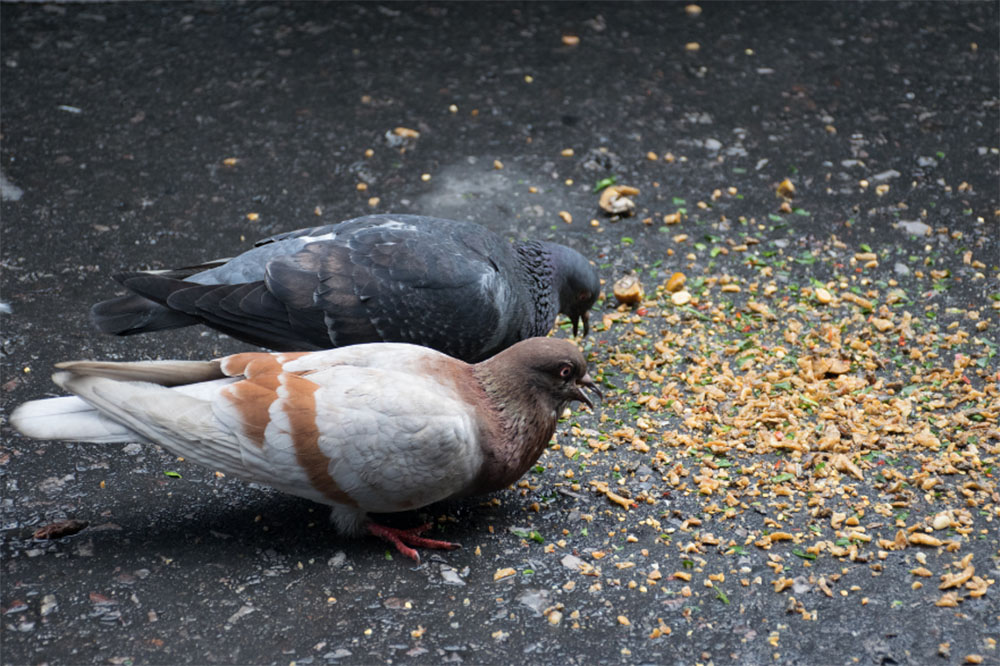
Additionally, some foods are toxic to pigeons and can cause them severe health issues.
This article will break down what pigeons can and can’t eat, as well as the best diet to give a pigeon.
It will also look at a few other things you should know about feeding pigeons, like whether you can feed them your leftovers.
What Can Pigeons Eat?
In order to figure out the best diet for a pigeon, we need to look at what they would eat in the wild. This will show what pigeons are designed to eat, and where their nutrients come from.
Wild pigeons mostly eat grains and seeds. In fact, this is the majority of their diet. Wheat, corn, and sorghum are some of the best grains for a pigeon.
In terms of seeds, pigeons will happily eat a wide variety, including sunflower seeds and sesame seeds. Most commercial bird-feeders will contain anywhere from 3-5 different types of seeds.
While both grains and seeds contain great nutrition for a pigeon, seeds can contain more fat and should therefore be limited in comparison.
Pigeons also eat fruits and berries, which give them extra nutrients like vitamins which are important to their health and development.
Vegetables are also good, however, make sure that they have enough nutritional value.
Green peas and dark leafy greens are perfect, whereas lettuce and cucumber contain too much water to be good food.
Also, while they aren’t the main focus of a pigeon’s diet, they will occasionally eat small insects and worms.
These provide extra protein and other nutrients to the pigeon’s diet, but are quite fatty so should only be eaten in moderation.
What Should Pigeons Not Eat?
So we’ve taken a look at what pigeons can eat – now let’s see what pigeons shouldn’t eat. There are plenty of foods that are harmful or unhealthy for a pigeon, and should be avoided at all costs.
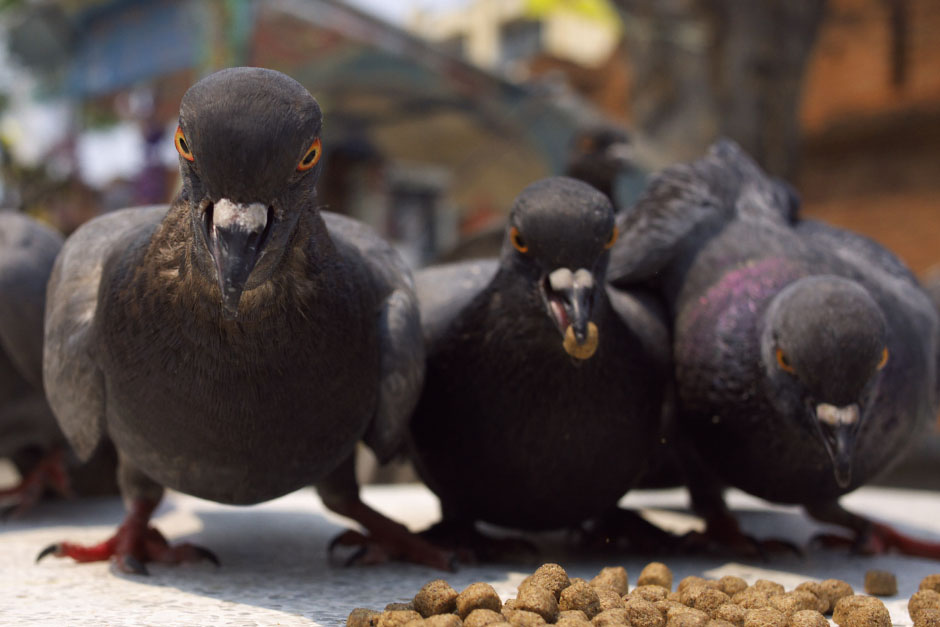
While throwing bread to birds is a traditional pastime, it is actually quite harmful to birds. Not only does bread not have adequate nutritional value for a pigeon, but it is also bulky and filling.
This can mean a pigeon will be full while malnourished, or could even lead to a blockage in their digestive system.
In fact, most foods meant for humans are completely unsuitable for a pigeon’s diet.
Pigeons have a completely different digestive system and metabolism to humans, and as such can’t digest foods that they wouldn’t encounter in the wild.
Foods like meat, fish, or cheese are unhealthy for a pigeon, as well as any overly-processed foods.
You should also avoid feeding a pigeon any fruits with seeds or pits.
These can be choking hazards if small enough to be swallowed, or can damage the bird’s beak.
Seedless fruits and berries are a great alternative, or you could even just remove the seed before giving the fruit to a pigeon.
Don’t give a pigeon anything to drink other than water.
Drinks like milk, juice, or anything caffeinated will either be indigestible for a pigeon and can even kill them. Water is all they need.
Last but certainly not least: some foods are highly toxic to pigeons, and will cause severe health issues if not death.
Do not let pigeons eat chocolate, avocados, or any foods containing xylitol (which is typically used as a sugar substitute).
Anything caffeinated is also a no-go. These are all very dangerous for pigeons, leading to issues like seizures, heart damage, or death.
If you’re unsure of whether a pigeon can eat a certain food, you are usually better off erring on the side of caution.
What Is The Best Food For Pigeons?
Now that you know what a pigeon can and can’t eat, you might be wondering what the best things to feed a pigeon are.
Bearing in mind what we have just covered, here is the best diet you should be giving your pigeon.
Pre-made birdseed will usually be suitable for getting a pigeon all the nutrients it needs, especially if they are catered specifically for pigeons.
However, there may be other foods you want to include to change things up a bit.
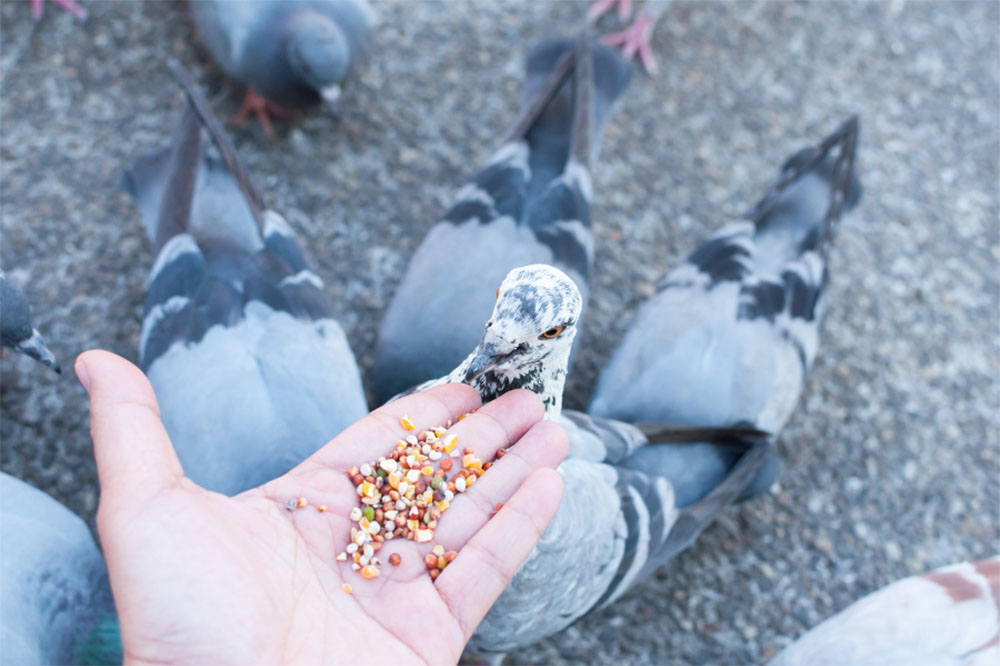
If you want to make your own pigeon food from scratch, it should mostly be made up of seeds and grains.
These are the most important parts of a pigeon’s diet, being what the majority of what they’d eat in the wild.
Consider supplementing the seeds and grains with some fresh fruit.
Make sure that all seeds have been removed, and that harder fruits are cut up. This will be a great way to increase the amount of crucial vitamins in a pigeon’s diet.
If you have a pigeon with specific dietary needs (such as a racing pigeon, whether it’s currently racing or did previously), make sure you adjust the diet accordingly.
You can get birdseed specifically for these pigeons, but if you’re making your own you will need to change what your pigeon is eating to make sure they’re getting enough nutrients.
Racing pigeons will need a diet more rich in protein and some minerals. Corn and insects can give a racing pigeon the extra nutrients it will need.
Something to consider is using grit in a pigeon’s diet.
Grit is usually not necessary, but may be helpful if you’re feeding a domesticated pigeon any seeds with the husks still on or if there is any other need for aid with digestion.
Alternatively, soluble grit like cuttlefish bone or eggshell can be a great way to get extra calcium.
If you’re just feeding wild pigeons in your garden, chances are they will have any grit that they need, so giving any more can lead to health problems like indigestion or an impaction.
You should only give pigeons water to drink. This is what they will be drinking in the wild, and as a result is what they can process best.
Pigeons shouldn’t drink milk or any drinks for humans as they won’t be able to digest it properly, and it may contain ingredients that can cause harm.
Clean tap or bottled water is more than suitable for keeping pigeons hydrated.
Can I Feed Pigeons My Scraps?
If you do a lot of cooking at home it can be tempting to just chuck any leftovers to the birds. This is especially true if you don’t have any pet birds and are just feeding the wild pigeons outside.
However, the same rules apply as with a pigeon’s regular diet – some foods are suitable for pigeons, but many aren’t.
If you’re going to feed pigeons your scraps, you need to make sure that it’s appropriate for them to eat.
You should avoid most human foods, as pigeons are not made to eat them. Again, the best food for pigeons is what they would be eating in the wild.
As such, any leftovers from a full meal are probably out of the question.
That’s not to say you can’t feed pigeons your leftovers – just that you have to be careful what it is you’re giving them.
Fruits with no seeds or pits are a good snack for pigeons, being a great source of nutrients.
You can also give pigeons uncooked oats, such as oatmeal. This is similar to a pigeon’s normal diet so don’t worry about tossing some out the window.
Just make sure that the oats are uncooked, as cooked oats or oatmeal will harden over the pigeon’s beak.
While the urban legend states you shouldn’t feed pigeons uncooked rice, cooked rice is more than suitable for pigeons.
Finally, while you can give pigeons bread in small amounts, it is usually best to avoid bread entirely.
The lack of nutrients in bread (especially in processed white bread) can leave pigeons malnourished, or expand inside their stomachs and cause health issues.

